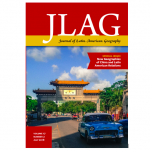Dr. Oliveira’s article “The Battle of the Beans: How Direct Brazil-China Soybean Trade Was Stillborn in 2004” has just been published in a special issue on “New Geographies of China and Latin America Relations” in the Journal of Latin American Geography.
The Journal of Latin American Geography is published by the Conference of Latin American Geography (est. 1970) and distributed by the University of Texas Press. According to Google Scholar, it is the sixth highest ranked journal of Latin American studies.
For the full length article, see: http://muse.jhu.edu/article/701025



